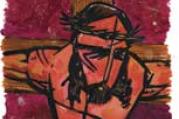Click here if you don’t see subscription options

Take to Heart
In The Moment, the Message, the Messenger (4/24), Tom Fox has issued a timely and eloquent plea for our collective commitment to convey the treasure of Catholic social teaching to our country. I share his conviction that our teaching can effect profound social change. At Catholic Relief Services, our re-examination and reflection on the church’s social teaching over the last decade has fueled an institutional transformation. We moved from being an agency that primarily engages in relief and development to one that also promotes justice, human dignity and global solidarity through all of our programs.
In that spirit, and at the risk of ruining a good Catholic construct of seven points, I would like humbly to propose an addition to Mr. Fox’s list of suggestions not only for better communicating the church’s social teaching but also for helping Catholics to live it. We must foster a sense of solidaritywith God, with all of humanity and with creation.
Solidaritythe conviction that we are responsible for and connected to one another, especially those who are poor and marginalizedcalls us to cherish and uphold the sacredness and dignity of every person, commit to and practice peace, justice and reconciliation, and celebrate and protect the integrity of all creation. At C.R.S. we believe that global solidaritystanding with our brothers and sisters overseaswill transform the world.
There are many ways for Catholics to practice global solidarity, such as making just economic choices by buying fair trade products, participating in a partnership with a parish or diocese overseas, advocating for just and transparent government policies or supporting missionary or relief efforts overseas. Catholic Relief Services provides these opportunities and more, to help Catholics put their faith into action on an international scale.
Both the Gospel and Catholic social teaching compel us to live as one human family by respecting the dignity of every human person, loving our neighbors as ourselves and promoting more just and peaceful societies. In other words, we are called to live in global solidarity. It is a message we all must hear and take to heart.
Joan Neal









Embarrassed and Offended
We were embarrassed to have readers call our attention to the offensive advertisement that escaped our unknowing eyes and appeared in the Dec. 5 issue. Like them, we were deeply offended.
The offense was compounded when we learned in the advertisers reply to a concerned reader that he had intended his art as an assault on Catholic faith and devotion.
We have taken several steps to tighten our advance review of advertising and express our outrage to the artist.
Our thanks to our readers and their friends for their sensitivity and forgiveness.
The Editors
Humanitarian Emergency
This is late, but thank you for the Rev. Donald H. Dunson’s article, A War on Children, (10/10) about northern Uganda. We who are here can hardly believe that this could happen, much less that it has been going on since 1986. I can imagine the incredulity and paralysis of those who are just hearing about the largest neglected humanitarian emergency in the world, as the United Nations described it.
Readers who want to learn more and perhaps pray and take some action could check www.ugandacan.org, associated with the Africa Faith and Justice Network in Washington, D.C. Walks and prayerful witness took place recently in 40 cities worldwide, including several in the United States.
Carlos Rodriguez, a Comboni father, whom you pictured, has made the church here proud, and the government often upset, as a fearless advocate for peace and for more relief to the 1.6 million people trapped in horrendous protected camps. Archbishop John Baptist Odama of Gulu and other religious leaders there, united ecumenically, have been no less inspiring.
And am I the only reader touched by the haunting cover photo by Don Doll, S.J. (10/31)? He wonderfully captures the dignity of southern Sudanese youth and their determination still to find a future despite the destruction of their country. I am proud that the Jesuit Refugee Service has been with them in Uganda and is now accompanying them home.
Tony Wach, S.J.
